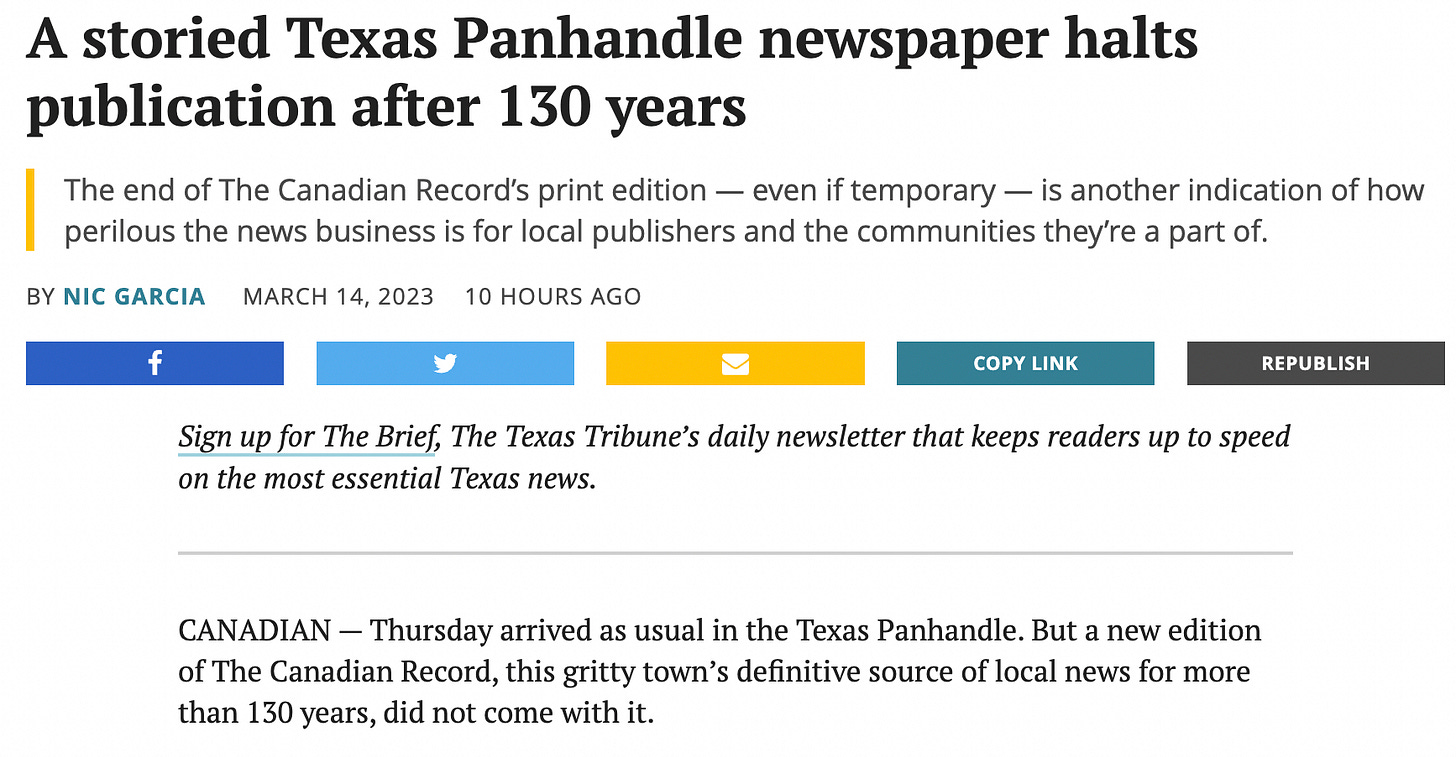Remarkably sad story in the Texas Tribune about the likely death of a small-town newspaper on the Panhandle.
I used to work at very small newspapers in small suburban towns, a project that burns with the fire of love in my heart and irritates me beyond my ability explain it. A small-town reporter can know the whole place, and be in everything; it’s a role that exemplifies the description of a newspaperman as a “prince of the city.” I covered cops, courts, city hall, water board meetings, fires, deaths, businesses coming and going, institutions and their (usually small) scandals, Girl Scout cookie drives, major street maintenance updates, and the weather. I looked up from my desk and said, “Hey, sirens!” The phone rang when stuff happened, because people wanted us to know about it. It was a constant pleasure. Yes, I re-read Winesburg, Ohio from time to time, and remembered that “only the few know the sweetness of the twisted apples.” Show me a small-town reporter who doesn’t have a copy of that book.
But a small-town newspaper can also bury you in the pettiness and vindictiveness of insular and stubborn communities, and especially of the kind of walking human pomposities who think of themselves as the people who actually run things: I’m the seventh generation of the most important family in Smallville, young man, and we don’t need you sticking your nose in things. Babbitry is real, and has versions through many different settings and across the ideological spectrum. I’ve been berated by red-faced mayors and city managers, and harangued by desk-thumping police chiefs, and finger-wagged on the sidewalk, and it was fun until it wasn’t. Note what this story about the paper in Texas says: It’s shutting down despite having no debts and a modest profit, because the owner-editor-writer-publisher is tired. Yes, ma’am.
The Canadian Record — Canadian, Texas is almost Oklahoma — was a liberal newspaper in a conservative town, though note what that meant: “In the decades that followed, Ezzell, a Republican, would enrage the town’s Dixiecrats by championing for civil rights and the end of the Vietnam War.” But it survived for over a century by covering things that mattered, as small-town papers do, through the ups and downs of mere disagreement:
The Record, owned by Laurie Ezzell Brown’s family since 1948, suspended its print edition March 2. The final front-page photograph captured billowing smoke. The banner headline yelled, “WILDLAND FIRE BLAZES PATH INTO OKLAHOMA.” Brown wrote the accompanying news article. Next to it was a brief about another fire that killed a local woman. There was a feature about the upcoming beef expo and a notice about the upcoming school board election. The school page featured a one-act play at the high school. And the community page had a local woman’s blueberry scone recipe. Brown had requested the scones be featured after tasting them.
As we lose these, lockstep corporate media won’t be writing about the upcoming beef expo. It’s another step toward echo chamber media. Newspapers run by people who request a local woman’s scone recipe after tasting the scones can’t be replaced.
I strongly encourage you to read this story, a remarkable depiction of both an important American place and a dying trade.


What a great article! "I'm tired" kind of sums up where we are at the present moment. Atlas is shrugging and with it, the age of diabolical narcissism is about to reach it's pitiful end.
I write for just such a paper. We have a reporter at every public meeting, every week. We also cover the annual yard sale at the big local university. Now that I don't live there, I do phone interviews for personality profiles, not breaking news or public meetings, but it's still all about the issues that matter to the real people in the town. When that paper goes away, the local people will be (unless they start attending three or four public meetings per week) less informed about the things that affect their real life, and if they continue to consume media of some kind, their view of what's happening and what matters will be ever more warped.